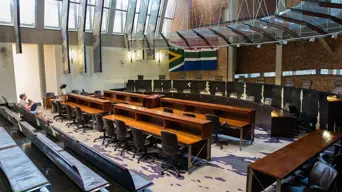ConCourt to hear Ramaphosa's referral of two bills
The president raises substantive grounds for the challenge, arguing that some provisions have a backdated effect and will apply to literary works before the legislation was enacted.

The Constitutional Court. Picture: Ashraf Hendricks/GroundUp
JOHANNESBURG - The Constitutional Court will on Wednesday begin hearing President Cyril Ramaphosa's application for the court's decision on the constitutionality of the Copyright Amendment Bill and the Performers' Protection Bill.
The president raises substantive grounds for the challenge, arguing that some provisions have a backdated effect and will apply to literary works before the legislation was enacted.
In 2022, the apex court declared the Copyright Act unconstitutional and invalid to the extent that it discriminated against persons who are blind and visually impaired and prevented their access to reading materials.
However, the court suspended its declaration of constitutional invalidity and ordered parliament to remedy the defects within 24 months.
That two-year period ended in September last year, but the copyright amendment bill has still not been signed into law by the president.
Ramaphosa referred the Copyright Amendment Bill and the Performers' Protection Bill back to Parliament for reconsideration.
READ: Ramaphosa refers Copyright Amendment Bill to apex court to determine constitutionality
While the national legislature addressed some concerns, the president was not satisfied that the substantive reservations had been accommodated and referred the two bills to the Constitutional Court for a decision on their constitutionality, triggering section 79 subsection (4)(b) of the constitution.
The president's concern, even after parliament deleted provisions that explicitly had a retrospective effect, is that they still apply to copyright works assigned before the new sections could potentially come into force.
The president argues that the provisions entitle an author to share in the royalty to any work for which the copyright has been assigned, despite when it might have occurred and is not confined to works of which the copyright is only assigned after the introduction of sections.
This application is seen as constituting a retrospective and arbitrary deprivation of property, violating Section 25 of the Constitution.